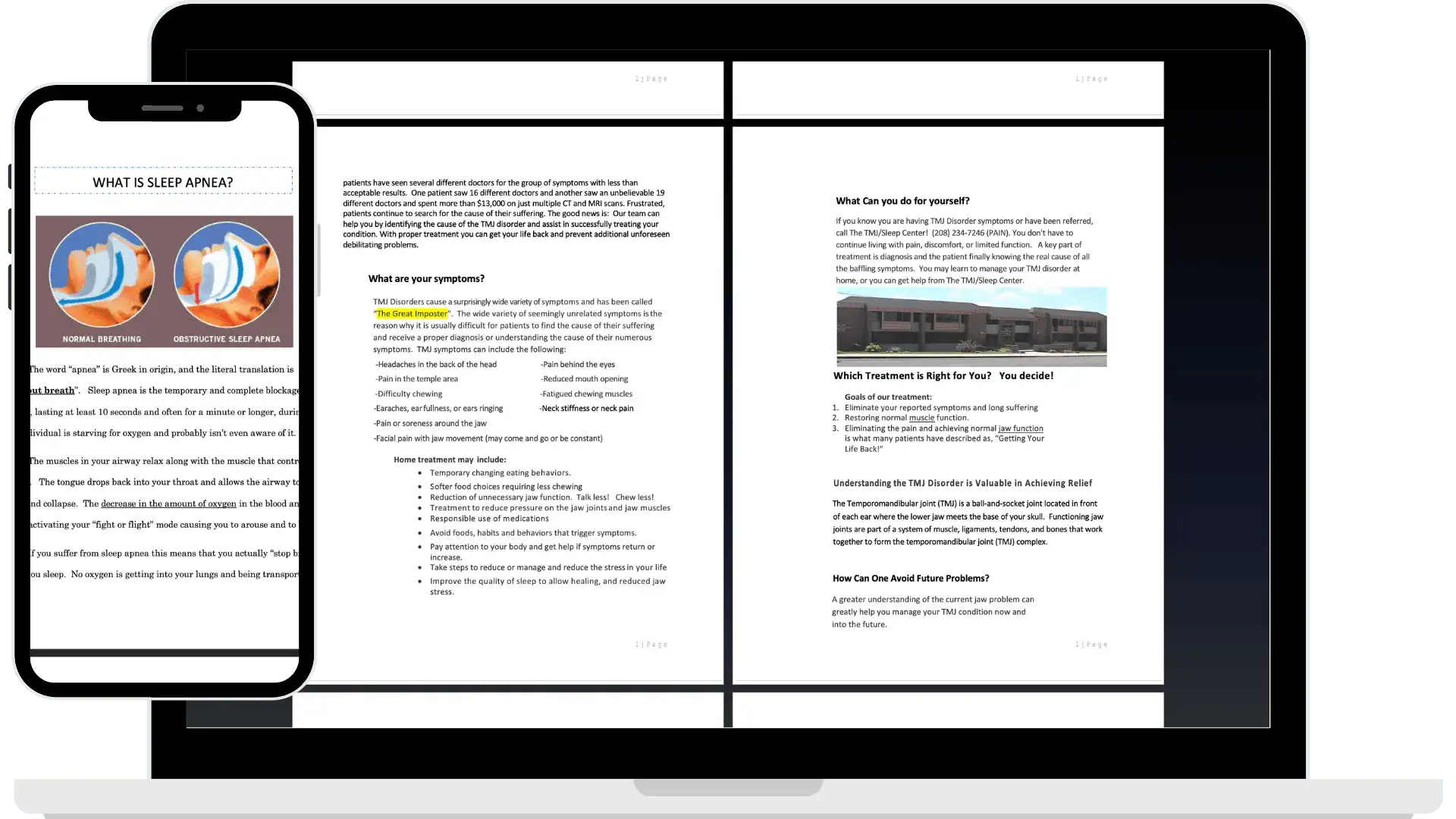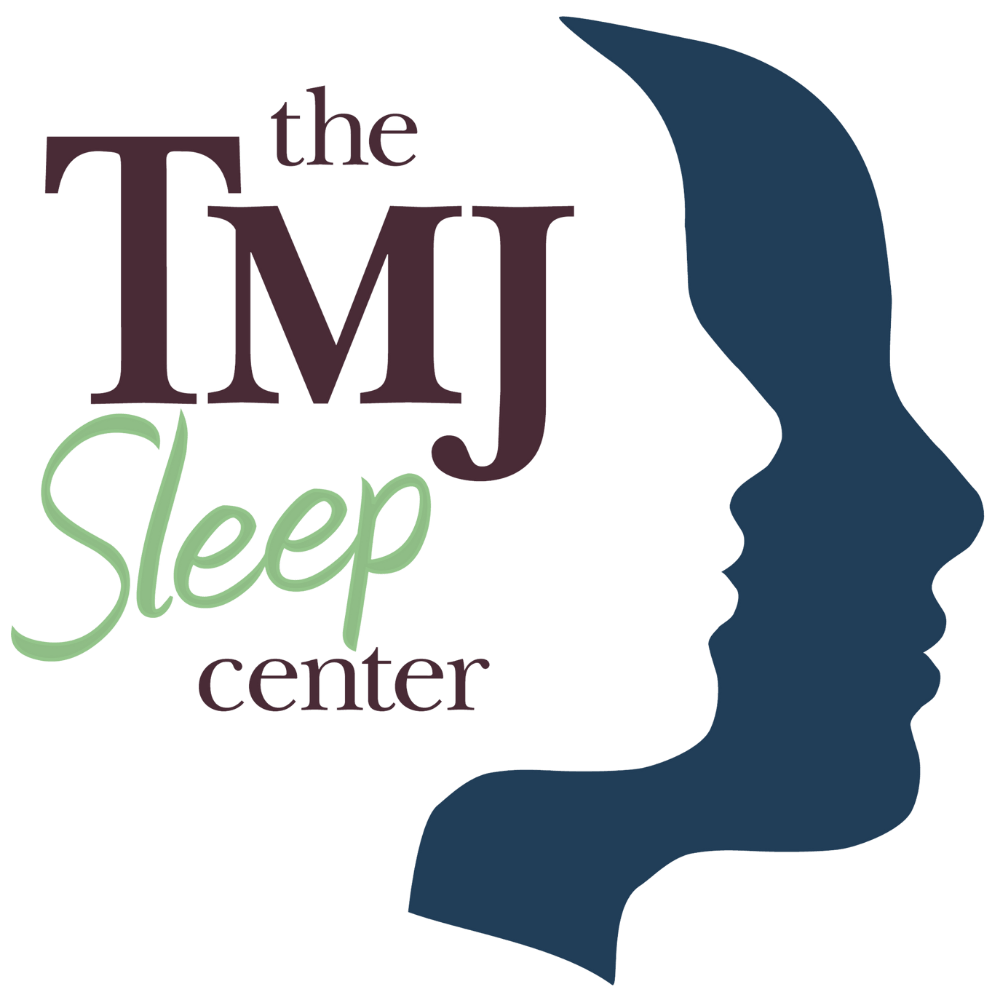Signs and Symptoms of TMJ
Headaches and Other Signs of TMJ Problems
If you’re experiencing a temporomandibular joint (TMJ) disorder, we can provide relief at the TMJ Sleep Center. The two joints on the side of your jaw (TMJ) attach the jaw to your skull and are each referred to as the TMJ. TMJ disorders are a condition in which one or both of these joints may be painful, noisy, or exhibits other symptoms.
TMJ disorders can cause a variety of conditions; although the most common symptoms are headaches, clicking or jaw-popping sounds, ear pain, pressure or ear ringing, or eye pain. It is crucial to have your medical condition evaluated by specialized a TMJ doctor.
The TMJ Sleep Center is locally owned with 40 years of experience; our clinic works with all insurance companies and even provides fresh-baked cookies while you wait. Call for a free courtesy consultation, and feel free today to take from this site a TMJ Patient Consumer Guide.
Call for an appointment or visit us today. Walk-ins are welcome.
Main Causes of TMJ
There are several possible reasons for a TMJ condition; the exact cause of the TMJ condition may not always be known. The following are the most typical contributing factors to a TMJ disorder:
- Trauma to the jaw, neck, or head, leading to arthritis and displacement of the jaw joint discs
- Excessive pressure on jaw joints and the muscle group involved in chewing, swallowing, and speech
- Bruxism, which is the habitual, involuntary clenching or grinding of the teeth
- A misaligned or misplaced jaw disc
- Degenerative joint conditions, such as osteoarthritis or rheumatoid arthritis
- Minor injuries due to headbutts or sports injuries
Whiplash (Indirect Trauma)
Whiplash occurs when the head is suddenly thrust forward and backward in a violent motion, and whiplash is a very common cause of TMJ injuries such as motor vehicle accidents and falls.
Common jaw injury complaints include:
- Headaches (especially temporal, frontal, and occipital pain)
- Facial pain, sinus pain, eye pain
- Ear pain, ear ringing, dizziness, or light-headedness
- Locking or clicking of the jaw
- Reduced or painful mouth opening (Normal is 50mm)
- Reduced ability to move the jaw side to side (Normal is 15mm)
Direct Trauma
Direct trauma and indirect trauma to the jaw during accidents are known to cause TMJ injuries.
Patients injured by trauma often suffer the following symptoms:
- Headaches (especially temporal, frontal, and occipital pain)
- Facial pain, sinus pain, eye pain
- Ear pain, ear ringing, dizziness, or light-headedness
- Locking or clicking of the jaw
- Reduced or painful mouth opening (Normal is 50mm)
- Reduced ability or difficulty moving jaw side to side (Normal is 15mm)
Opening Too Wide
When the mouth is propped open too wide for a long time or your mouth is quickly forced open, the jaw joint ligaments may be permanently stretched or torn. Long dental appointments with the mouth propped open or medical procedures with the jaw propped open are known to cause or contribute to jaw joint injuries (TMJ).
Patients with TMJ injuries often suffer the following symptoms:
- Headaches (especially temporal, frontal, and occipital pain)
- Facial pain, sinus pain, eye pain
- Ear pain, ear ringing, dizziness, or light-headedness Locking or clicking of the jaw
- Reduced or painful mouth opening (Normal is 50mm)
- Reduced ability to move the jaw side to side (Normal is 15mm)
- Jaw joint pain and swelling
Signs and Symptoms of TMJ Disorders
- Jaw pain/discomfort (often in the morning)
- Headaches
- Eye, facial, shoulder, neck, or back pain
- Ear pain or ear ringing or ear pressure
- Locking or clicking of the jaw
- Limited range of motion in the jaw
- Teeth clenching or grinding
- Dizziness
- Sensitive teeth (absent an oral health condition)
- Numbness or tingling in the fingers
- A misalignment of the upper and lower teeth
Associated Facial Pain
You can experience facial fatigue or ache if you experience TMJ issues. Additionally, you can feel discomfort in your ears, around your ears, or even behind your eyes (ear aches). This is because several nerves originate from the brain stem that surrounds these facial regions.
When muscles or bones close to the skull become overworked or misaligned, as is frequently the case with TMJ disease and the joint itself, they may significantly harm nearby structures like the ear and eye socket.
Ear Ringing
Tinnitus, often known as ringing in the ears, can also sound like roaring, clicking, hissing, or buzzing. There are a few possible explanations for the connection between TMJ pain and tinnitus. First off, some of the jaw's chewing muscles are close to others that penetrate the middle ear.
Second, there may also be a direct relationship between one of the middle ear hearing bones and the ligaments that link to the jaw. The nerve supply coming from the temporomandibular joint has also been demonstrated to connect to brain regions involved in hearing and sound interpretation.
Untreated TMJ Disorder
TMJ can lead to various issues if it is not addressed, including:
Chronic Jaw Pain
If TMJ is not treated, symptoms, including pain, can get worse. The pain may progress from mild and sporadic to severe and ongoing if left untreated for an extended period.
Joint Injury and Inflammation
These effects include harm to the affected joint or joints. The body will respond by continuing to swell if it can't heal properly.
Recurring Headache
Untreated TMJ discomfort can sometimes make headaches worse. The TMJ, which joins the jaw and all of the muscles that surround the skull, can result in headaches. The issue may become more frequent and severe if the root cause is not addressed.
Degenerative Jaw Joint Disease
Failure to restore the jaw joint position and normal joint motion will result in arthritic changes in the bone primarily degeneration of the ball in the socket (condyle). Abnormal jaw joint position and abnormal jaw motion causes muscle tension and pain.
Sleep Disorder
TMJ patients commonly have poorly managed pain and usually poorly fitting teeth. The combination of the misaligned jaw joint, poorly fitting teeth, and muscle pain result in impaired, poor, or rest less sleep. Yes, rest less!
Reviews
Related TMJ Services


Learn More About
The TMJ Sleep Center
Located at 1777 E Clark St, Pocatello, ID, We specialize in the treatment of TMJ disorders, migraine headaches, and sleep apnea treatments. Work with all insurance. Complimentary consultations. Walk-ins welcome. Call today for an appointment or visit us.


Share On: